Let someone else pay for it
The weeping and gnashing of teeth will continue as commuters are charged a fee for clogging up city streets.
If there's one thing that unites Americans, it's the belief that we shouldn't have to pay for the transportation systems we use, either in our own town or when visiting another town.
We just went through an election where a majority of voters said "I don't want socialism." Then one city says they're going to charge people for adding to congestion and the whole country unites like "we like the socialism version!" The unifying political principle seems to be “you should chip in for my travel expenses.” It’s incredible. (More on that city in a minute.)
Everyone wants point-to-point transportation with no delays at the same time as everyone else, but nobody wants to pay for it.
Each taxpayer contributes to car infrastructure, regardless of their individual car usage. A considerable portion of road construction and maintenance is funded by general tax revenue rather than user fees. In 2020, some Harvard students published a study investigating the true cost of maintaining the car economy in Massachusetts. Here’s part of the recap in the Harvard Gazette:
The paper, which the students wrote as part of an applied lab course, found that costs are diffused across a number of areas and involve things people don’t often consider. Beyond those for individual drivers, road maintenance, snow removal, and policing, there are less-obvious ones, such as those associated with added pollution, value of land set aside for parking lots, lost productivity from sitting in traffic, and various costs associated with injuries and deaths on the road.
Using publicly available data, the authors put the annual public tab at $35.7 billion, which amounts to about $14,000 for every household in the state. Those that do own vehicles pony up an additional $12,000 on average in direct costs.
The authors say their goal is to demonstrate the total costs of driving so that information can be used for comparison when held up against other types of transit investments, like bus, subway, and train systems.
There isn't a city or state in the country where people are paying for the car infrastructure they use. As a car owner, I too am a recipient of the wealth distribution scheme. One of the favorite complaints about toll roads and congestion pricing in op-eds and social media is “this is an unfair tax because motorists already paid for the roads.” If customers pay for 50% of a product, then it's factual but not truthful to say customers pay for that product. Factual, because some of their money does go towards the product. But not truthful, because their payment doesn’t come anywhere near covering the cost of the product.
New York City started a tolling program January 6, 2025, for motorists entering Manhattan at 60th Street or below (the “congestion relief zone”). Here’s what it costs people to drive in:
Cars/SUVs/pickups: $9
Non-commuter buses: $14.40
Big rigs: $21.60
Motorcycles: $4.50
Holland Tunnel: 27 mins ➡️ 9 mins
Lincoln Tunnel: 10 mins ➡️ 3 mins
Williamsburg Bridge: 11 mins ➡️ 6 mins
After a full week, the congestion relief zone is living up to its name. Fewer people are driving themselves and transit ridership is up for the outer-borough commuters. Local TV news stations have been showing man-on-the-street interviews with actual commuters (as opposed to social media warriors) who are saying variations of “wow, it’s working.”
Meanwhile, online, these are by far the most common type of people filling up my replies on this topic:
People who have no idea their car lifestyle is subsidized. ("We already paid for this.")
People who swear congestion pricing disproportionately affects poor people who drive and park in Manhattan every day. (If that was real, media interviews with those travelers would be all over social media.)
People who insist that charging a driver for contributing to gridlock is communism, but charging all taxpayers to cover other people's travel expenses is definitely not communism.
The comment about hurting the poor is another case of factual but not truthful. Factual, in that there are some poor people who drive into Manhattan. Not truthful, because only about 2% of the outer-borough poor drive into Manhattan, and there are heavy discounts for them. The alternative, a stronger transit network that isn’t stuck in traffic, helps far more people than it hurts.
Transportation has costs no matter where you live, and no one likes paying for them. The challenge in launching a user-pay system of any kind is that people have been conditioned to think transportation infrastructure has already been paid for. A considerable portion of road construction and maintenance is funded by general tax revenue rather than user fees. There isn't a city or state in the country where people are paying for the car infrastructure they use. As a car owner, I too am a recipient of the wealth distribution scheme.
An anonymous account on X said, “We pour a gazillion dollars into infrastructure for public transit in nyc.” This is what people don't understand: a gazillion dollars isn't enough because Americans want more and more and more car infrastructure.
If you owned a bridge in a voluntary society, you'd charge higher prices to cross at the busiest times. As a traveler, I might choose to save my cash and take a longer way around. Or I might pay the surge fee if I was running late. That's how a market would work. I would make my own benefit/cost calculation.
The person managing the bridge would adjust the price based on demand. They'd be doing their own benefit/cost calculation because if they set the price too high, no one would come through and they’d be losing money on their bridge investment. If the price was too low, too many people would try to come through at the same time, introducing new hassles for management.
New York City isn’t suddenly a free market. Ideally, the $9 toll would be much higher in peak periods, and would adjust according to conditions. I’m not pretending city agencies will suddenly behave like private enterprises, but it’s encouraging to see a move in the direction of sound economics.
There are many reasons to be skeptical of how transportation infrastructure is funded, and whether or not a particular agency is trustworthy. But start with the economics conversation. Maybe you think all taxpayers should chip in for your travel expenses. In that case, you'll continue to oppose congestion pricing. But at least be honest about what you want, and for a great many Americans that seems to be: "Someone else will pay for it."
"Some things are believed because they are demonstrably true. But many other things are believed simply because they have been asserted repeatedly—and repetition has been accepted as a substitute for evidence."
—Thomas Sowell
Americans have been repeating the lie for ages that roads are funded through car registrations, gas tax, and other user-ish fees. Taxpayers are forced to chip in for the travel expenses of other people, regardless of how much of a burden individual taxpayers put on transportation systems. That leads to households hemorrhaging money without talking about why or how.
There's a huge opportunity for emotionally charged topics like congestion pricing to get people talking about funding formulas. The incoming Secretary of Transportation doesn't have power over the federal-to-state funding formulas, but could certainly use his very public bully pulpit to get the attention of Congress and all of us taxpayers.

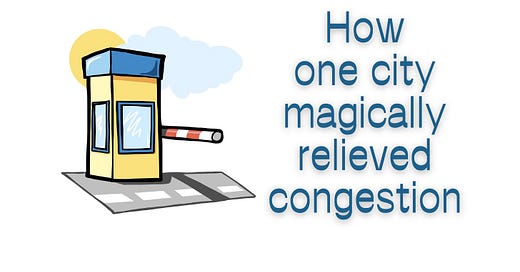


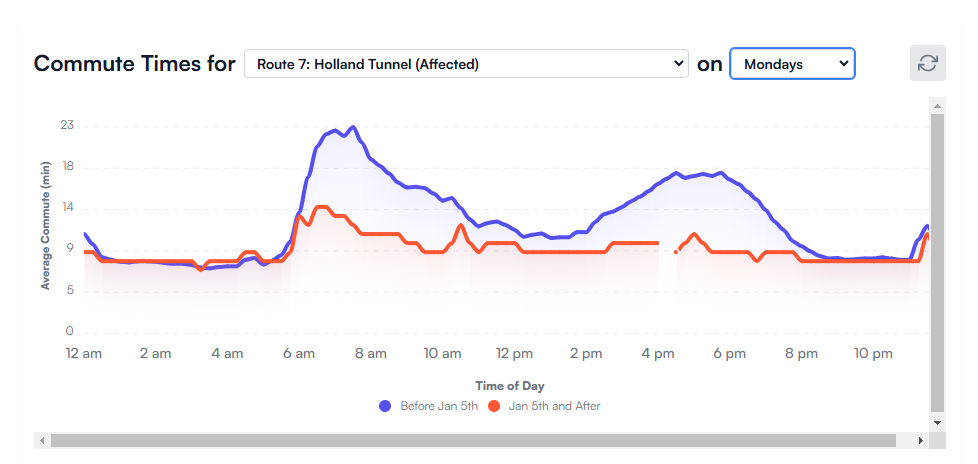
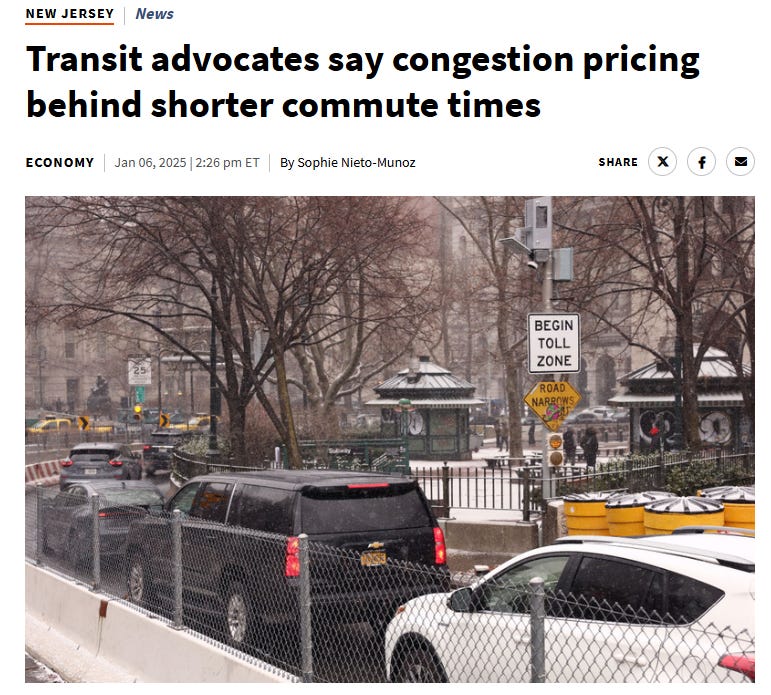
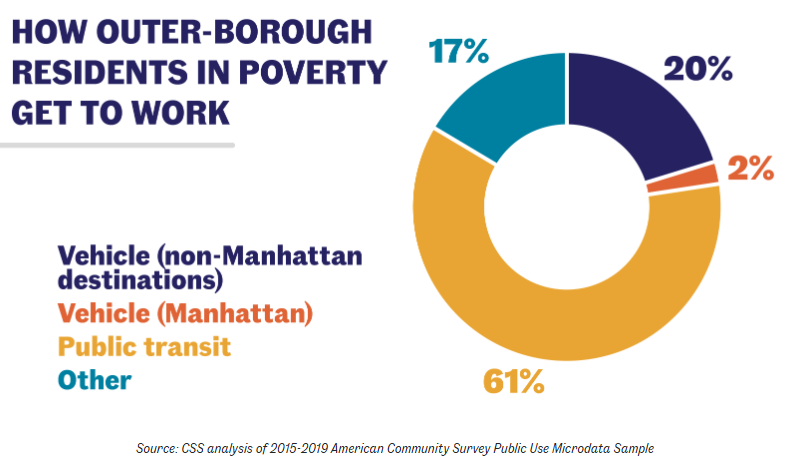
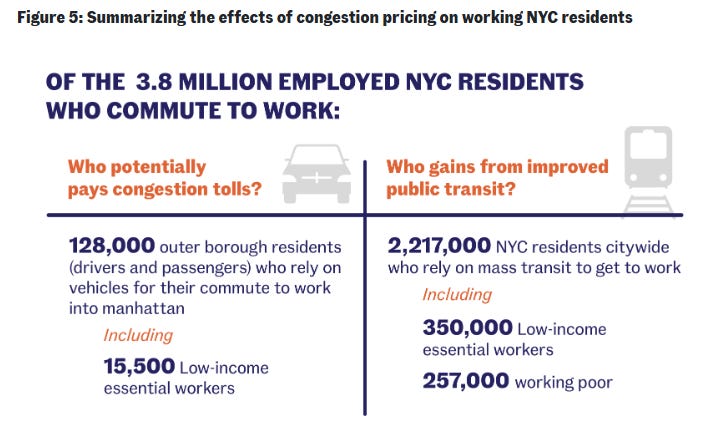
Great article Andy!
Love the post, Andy. Keep up the great work! What do you think of referring to it as “decongestion pricing”, (credit Jarrett Walker) since that is what it actually does?